by WorldTribune Staff, June 28, 2018
Australia on June 28 passed legislation aimed at preventing interference by foreign governments in Canberra’s affairs.

The new law, which mirrors similar rules in the United States, will require lobbyists for foreign countries to register, and makes them liable for criminal prosecution if they are deemed to be meddling in Australia’s domestic affairs, Reuters reported.
Australian Prime Minister Malcolm Turnbull last year referred to “disturbing reports about Chinese influence” as justification for the legislation.
“Foreign powers are making unprecedented and increasingly sophisticated attempts to influence the political process, both here and abroad,” Turnbull said at the time.
Related: Pentagon reviewing its research contracts at universities with Chinese partnerships, June 26, 2018
Related:
China has denied allegations of meddling in Australian affairs, but concern over Chinese political donations and relationships between lawmakers and Chinese businesses has intensified in Australia, the report said.
Chinese telecommunications firm Huawei Technologies “has emerged as a lightning rod for Australian security fears,” the Reuters report said.
Huawei, the world’s largest maker of telecommunications network equipment and the No. 3 smartphone supplier, has already been virtually shut out of the U.S. market because of national security concerns. It is lobbying to avoid a similar fate in Australia.
The legislative package includes the new Foreign Influence Transparency Scheme Bill, which requires the registration of lobbyists working for foreign governments.
Another amended law expands potential crimes to include meddling by these agents.
Chinese Foreign Ministry spokesman Lu Kang said law-making was a country’s internal affair and he declined to comment, though he did appeal for all countries to “abandon Cold War thinking.”
“We further want all other countries in the world to follow the principle of not interfering in other countries’ internal affairs,” Lu said. “So we hope that all countries can abandon Cold War thinking and on a foundation of mutual respect and equal treatment pursue better communications and cooperation. We believe this better fits with the interests of all countries’ peoples.”
Subscribe to Geostrategy-Direct __________ Support Free Press Foundation
